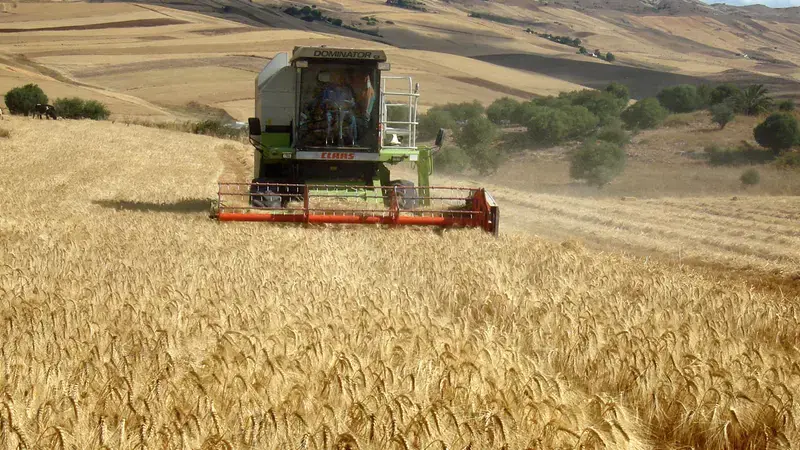Protecting dryland crops in the face of climate change

By Dr. Hatem Cheikh M'hamed, Zied Idoudi and Dr. Aymen Frija
As climate change intensifies and global shocks such as the COVID-19 pandemic spur countries to become more self-sufficient, ICARDA’s research will be critical for the viable future of staple crop production in dry areas. In Tunisia, ICARDA studies, partly funded by the International Fund for Agricultural Development (IFAD), on the use of conservation agriculture to improve the climate resilience and yield of durum wheat, are showing encouraging results.
Conservation Agriculture (CA) is widely seen as a promising adaptation strategy for more climate-resilient crop production, especially in the Mediterranean region—one of the most climate-vulnerable areas in the world1. CA involves avoiding plowing, diversifying crop rotations with pulses and forages, and leaving crop residue in fields so that farmers benefit from improved soil fertility, enhanced nutrient availability, and water conservation, leading to increased yields and better water-use efficiency2. The research of ICARDA and its partner National Agricultural Research Systems (NARS) has shown that grain yields under CA systems can be up to 15 percent higher and more stable than for tillage systems, according to the agro-ecological zone. In addition, by not plowing, farmers save money on the costs of fuel, time of fieldwork and labor.
Demonstrating the efficacy of CA production systems
A joint INRAT-ICARDA research study published in the journal Science of the Total Environment addresses a knowledge gap in climate change impact and demonstrates the potential of CA for Tunisian farmers to adapt their crops to rising temperatures and increasing water scarcity.
There were two main objectives to the research: i) to assess the long-term impact of climate change on durum wheat productivity, soil organic matter accumulation, and soil resistance to water erosion; and ii) to identify potential areas where CA is technically suitable to be adopted and would result in positive environmental and production impacts.
The joint team of INRAT and ICARDA researchers used the Agricultural Production Systems Simulator (APSIM) model to predict the effect of conventional tillage versus zero tillage and soil residue retention (CA) on wheat productivity, soil fertility and soil erosion. Modeling approaches are advantageous because they can be applied to fit crop responses under different stress conditions and can be used also by decision-makers to further develop strategies. Two contrasting locations were selected to study the effects: one in a semi-arid area (Kef) and another location with prevailing sub-humid conditions (Bizerte).
Strong evidence to go forward
The results were immensely encouraging and demonstrated that retaining crop residue generates positive effects under both semi-arid and sub-humid conditions - enhancing wheat yield by 15 percent; improving water use efficiency by 18 and 13 percent, and increasing soil organic carbon accumulation. Mulching also slows the annual rate of soil erosion by 1.7 tons in the semi-arid to 4.6 tons in the sub-humid of the arable soil layer in each hectare.
The study also identified priority areas in Tunisia for CA adoption, spread across 260,000 hectares in the north of the country and representing at least one-fifth of the country’s total cereal area.
A targeted strategy to scale-up CA
CA is often held back by a lack of appropriate technologies, a lack of behavioral change training on an agricultural system that is more complex than traditional methods, and unfavorable policy environments. However an ICARDA-managed initiative has now facilitated the manufacture of key equipment such as low-cost seeders in Algeria and Tunisia, and training sessions and show plots are planned with farming communities, thus unlocking the demand for CA technologies in many niches across dominant cereal production areas.
Conservation agriculture could be a critical adaptation strategy for global farmers contending with rapidly changing climatic conditions. By maintaining, and even increasing, staple crop production, countries can also avoid increased dependence on cereal imports, an issue starkly exposed during the COVID pandemic. Proven science like this can be game-changing justification for adopting and encouraging new methods at different institutional levels. However, a policy environment that enables such development remains the main factor that will lead to effective, and global, scaling out and up of such innovations.
-------
Dr. Hatem Cheikh M'hamed is Agronomist-conservation Agriculture and CLCA National Project Coordinator for Tunisia. Zied Idoudi is an ICARDA consultant for Technology Scaling Specialist (TSS). Dr. Aymen Frija is ICARDA’s agricultural economist.
--
1 Lobell, D.B., Gourdji, S.M., 2012. The influence of climate change on global crop productivity. Plant Physiol. 160, 1686–1697. https://doi.org/10.1104/pp.112.208298.
2 Parihar, C.M., Jat, S.L., Singh, A.K., Kumar, B., Yadvinder-Singh., Pradhan, S., Pooniya, V., Dhauja, A., Chaudhary, V., Jat, M.L., Jat, R.K., Yadav, O.P., 2016. Conservation agriculture in irrigated intensive maize-based systems of north-western India: effects on crop yields, water productivity and economic profitability. Field Crop Res. 193, 104–116, doi:https://doi.org/10.1016/j.fcr.2016.03.013.
